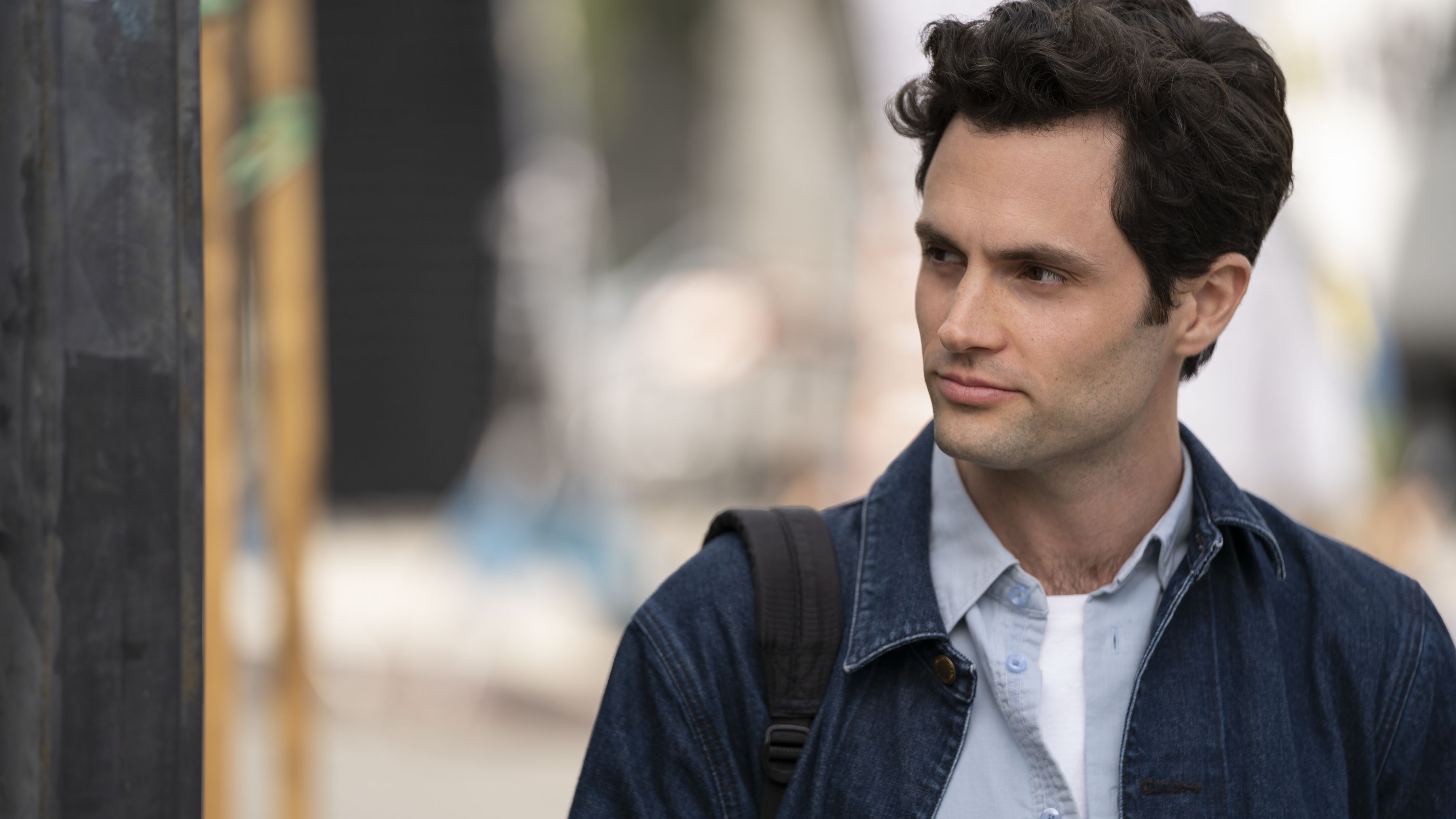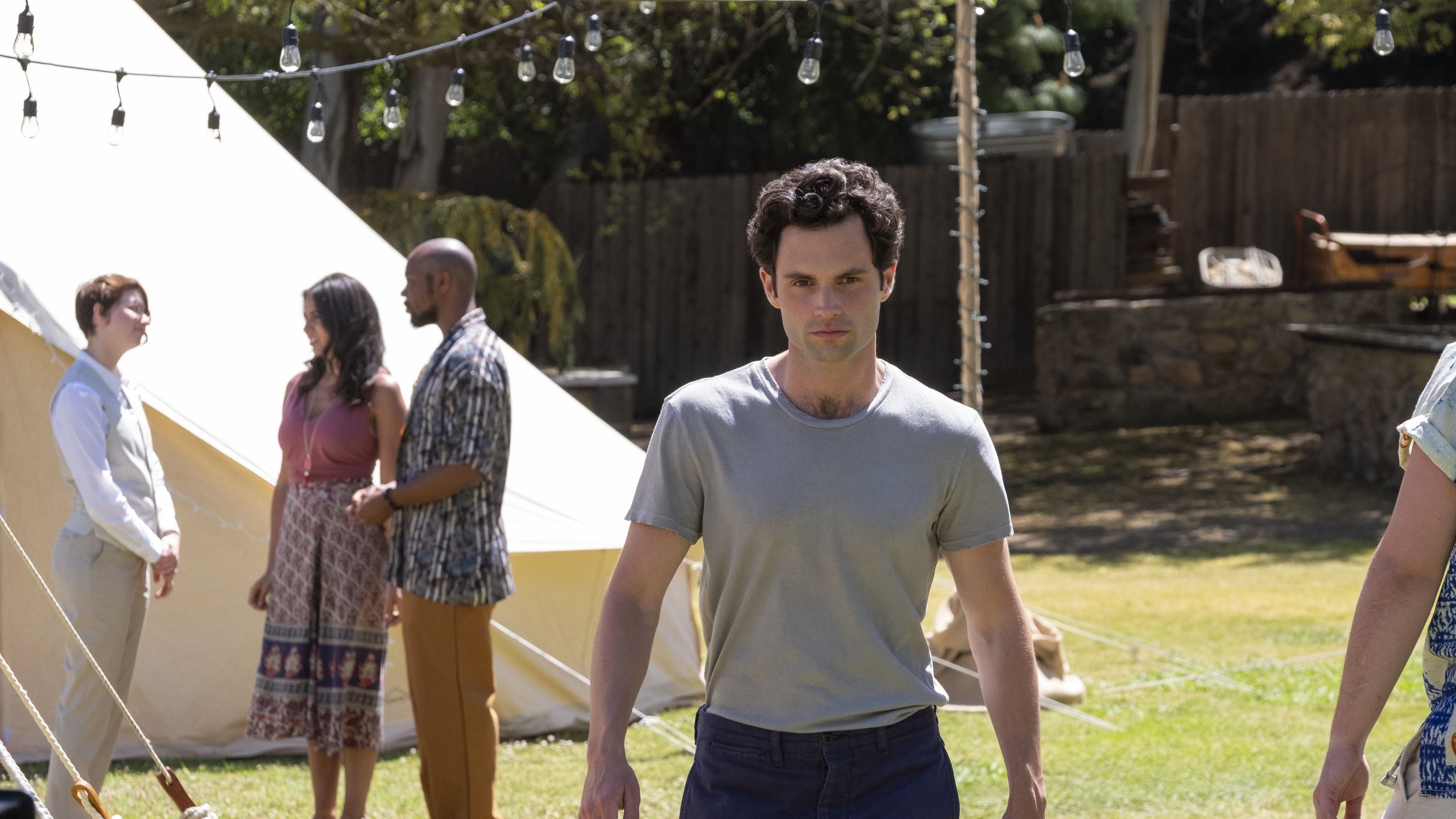Netflix's 'You' Is a Gorgeous, Thrilling Show — With an Ugly Problem
Its compelling second season sends an unsettling message.


The "sexy psychopath" isn't a new character type. We've had Norman Bates in Psycho, Sharon Stone in Basic Instinct, Moriarty in the Sherlock BBC series. But Joe Goldberg in You, which debuted on Netflix in 2018, was among the most compelling iterations of the trope in recent memory. The character possessed a dark, possessive mind, but he acted like he was in his own personal rom-com. Joe was a psycho for the Internet age, a murderous, love-crazed millennial—and Netflix viewers were totally seduced. Season two, on the other hand, tries to make Joe even more relatable and nuanced. And that's kind of a problem.
Joe, who's now on the run and going by a new name, is still played with brutal perfection by Penn Badgley. His sparkling eyes, his slow grin, even his posture—it's all meant to be both entirely charismatic and entirely terrifying. You find yourself rooting for him, then you have to catch yourself. That's what made season one so devastating: You wanted Joe and Beck to work out, to believe Joe could stop his own horrible impulses...right up until the moment he kills her. Season one felt like an upsetting and cathartic ride, culminating in the viewer being forced to come to grips with who Joe really is. Despite some impulses towards care and compassion, he's nothing but a killer underneath.
Season two immediately walks us back. This season, Joe feels loss, mourns, attempts to make positive change, and tries to avoid the temptation of bad behavior via his ever-present internal monologue. It's like the most extreme possible version of a reformed bad boy—and we starting feeling like we're on Team Joe again. It's not just a double role, it's a dual personhood: Joe's a cold-hearted murderer, and an effective one, but he's also feeling profound feelings that aren't rooted in self-interest or violence. He's a monster, and he's not.
To borrow a line from another "sexy psycho" show, Killing Eve: "When you think of a psychopath, you tend to think of a regular person and then you add certain negative traits: violence, narcissism, sadism. That's a mistake—don't add. Take away everything that makes us human. They're like facsimiles. They're copycats." And yet, ironically, both Killing Eve and You break that basic rule by depicting unrealistically nuanced characters. In essence, Joe and sexy assassin Villanelle are only half-psychos—they're compulsive liars who aren't afraid to kill, but they still display aspects of deep humanity and lovability. Villanelle and Joe become more humanized, not less, in the second season of their respective shows. The humanity we look for and may never find in a real psychopath is found in spades in these fake ones.
This feels particularly unrealistic: Joe wouldn't exist in real life. But Ted Bundy did.

Penn Badgley as Joe Goldberg in season two.
It's not surprising that after season one went mainstream, Penn Badgley had to undermine his own character and fend off fans who love Joe. "You’re supposed to see past my face TO the crazy shit!" he explained to rabid fans who saw Joe as some sort of PILF (psycho they'd like to...you get it) and said they wanted to be kidnapped by him. But you can also see where their adoration comes from. There are moments of real humanity from the character, when he's not finding new, terrible ways to murder people who get in his way.
Season two makes that situation even more complicated, which doesn't mitigate any of the criticism that the show isn't drawing a clear enough line between Joe and his actions. Remember—we're still being encouraged to root for someone who stalks and kills women. This season we get glimpses of Joe's terrible, abusive childhood, which muddies the waters even more.
Get exclusive access to fashion and beauty trends, hot-off-the-press celebrity news, and more.
To the show's credit, Joe is not off the hook entirely for his behavior. Season two plays out as a horrible, funhouse mirror reflection of season one: Joe is stuck reliving a similar situation, despite his best intentions. There's a vulnerable neighbor and her sharp, suspicious older sister (Jenna Ortega and Carmela Zumbado), a potential abuser that Joe has his eye on (Chris D'Elia), and a manic pixie dream girl who's way more complicated in real life (Victoria Pedretti, who's fantastic). There's not a single bad performance this season.
Season two plays out as a horrible, funhouse mirror reflection of season one.
Mercifully, season two's arc is more complex than a simple stalk-date-kill, and feels slightly more empowering for the new characters who come into Joe's orbit. But there's also a huge, show-changing twist that I don't think totally works. Without diving into spoilers, Joe isn't the only half-psycho in L.A., which feels like yet another turn away from realism. This might be why the showrunners want us to relate to him—because there's someone worse out there. That makes it hard to know who to root for, and why. (It's also worth noting that apparently Caroline Kepnes' second book Hidden Bodies handles Joe's arc in a slightly more complex way, with a different ending.)
Watching the second season of You feels like entering a strange alternative universe, filled with relatable, redeemable crazy people. In this world, you might understand the reasoning behind dating a psychopath, because he's trying so hard not to kill people. By conflating the narcissistic self-interest of Los Angelenos and Joe's disfunction, the show sets up a sameness between him and the rest of us posting selfies on Instagram and hoping to find The One. We're all capable of being Joe, in other words.

Victoria Pedretti as Love.
This actually reminded me of another fictional tale of psychopathy, Gone Girl, which (unlike You) manages to make a disturbed character interesting without undermining the severity of their disorder. But the effect of both Gone Girl and You is similar—we come away feeling unsettled, wondering, Is my significant other crazy? The challenge with You season two is that another, more horrifying question immediately comes to mind. Is that so bad, really?
I'm not saying you shouldn't watch this season. You absolutely should. But it's important to remember that this season doesn't actually depict what it means to come in contact with an obsessive, murdering sociopath, as season one did. Watching it is utterly, utterly compelling. It's also a little dangerous.
You season two drops on Netflix December 26.
For more stories like this, including celebrity news, beauty and fashion advice, savvy political commentary, and fascinating features, sign up for the Marie Claire newsletter.
RELATED STORY


Katherine’s a contributing syndications editor at Marie Claire who covers fashion, culture, and lifestyle. In her role, she writes stories that are syndicated by MSN and other outlets. She’s been a full-time freelancer for over a decade and has had roles with Cosmopolitan (where she covered lifestyle, culture, and fashion SEO content) and Bustle (where she was their movies and culture writer). She has bylines in New York Times, Parents, InStyle, Refinery29, and elsewhere. Her work has also been syndicated by ELLE, Harper’s Bazaar, Seventeen, Good Housekeeping, and Women’s Health, among others. In addition to her stories reaching millions of readers, content she's written and edited has qualified for a Bell Ringer Award and received a Communicator Award.
Katherine has a BA in English and art history from the University of Notre Dame and an MA in art business from the Sotheby's Institute of Art (with a focus on marketing/communications). She covers a wide breadth of topics: she's written about how to find the very best petite jeans, how sustainable travel has found its footing on Instagram, and what it's like to be a professional advice-giver in the modern world. Her personal essays have run the gamut from learning to dress as a queer woman to navigating food allergies as a mom. She also has deep knowledge of SEO/EATT, affiliate revenue, commerce, and social media; she regularly edits the work of other writers. She speaks at writing-related events and podcasts about freelancing and journalism, mentors students and other new writers, and consults on coursework. Currently, Katherine lives in Boston with her husband and two kids, and you can follow her on Instagram. If you're wondering about her last name, it’s “I go to dinner,” not “Her huge ego,” but she responds to both.
